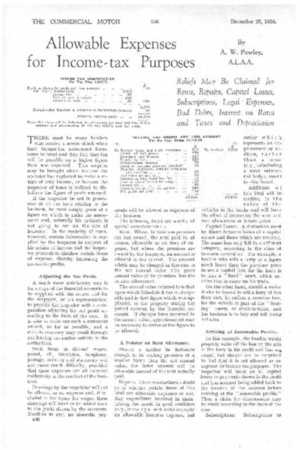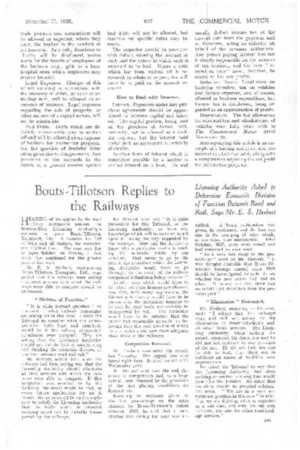Allowable Expenses for Income-tax Purposes
Page 36

Page 37

If you've noticed an error in this article please click here to report it so we can fix it.
By A. W. Powley, A.L.A.A.
THERE must be many hauliers who receive a severe shock when their income-tax assessment forms come to hand and they find that tax will be payable on a higher figure than was expected. This surprise may be brought about because the operator has neglected to make a return of total income, or because the
• inspector of taxes is inclined to disbelieve the figure of profit returned.
If the inspector be not in possession of all the facts relating to the business, he must simply guess at a figure onwhich to make his assessment and, naturally his estimate is not going to err on the side of leniency. In the majority of cases, however, certain information is supplied by the taxpayer in support of his return of income and the inspector proceeds to disallow certain items of expense, thereby increasing the assessable profits.
Adjusting the Net Profit.
A much more satisfactory way is for a copy of the financial accounts to be supplied with the return and for the taxpayer, or his representatiye, to provide the inspector with a computation adjusting the net profit according to the facts of the case. It is wise to make out such a statement oneself, so far as possible, and a definite economy may result through not leaving the matter entirely to the authorities.
Such items as drivers' wages, petrol, oil, insurance, telephone, postage, printing and stationery will not cause much difficulty, provided that these expenses are all incurred exclusively in the conduct of the business.
Drawings by the proprietor will not be allowed as an expense and, if included in the figure for wages, these drawings will have to be added back to the profit shown by the accounts. Needless to say, no domestic pay B30 ments will be allowed as expenses of the business.
The following items are worthy of special consideration :—
Rent. Where the business premises are not owned, the rent paid is, of course, allowable as an item of expense, but where the premises are owned by the taxpayer, an amount is allowed in lieu of rent. The amount which may be charged in this case is the net annual, value (the gross annual value of the premises, less the repairs allowance).
The annual value referred to is that upon which Schedule A tax is chargeable and is that figure which was applicable to the property during the period covered by the financial accounts. If changes have occurred in the annual value, apportionment may be necessary to arrive at the figure to be allowed.
A Pointer on Rent Allowance.
Should a haulier be fortunate enough to be renting premises at a smaller figure than the net annual value, the latter amount will be allowable instead of the rent actually paid.
Repairs. There is sometimes a doubt as to whether certain items of this kind are allowable expenses or not. Any expenditure. incurred in maintaining the assets in good condition (e.g., renewing a back axle) is clearly an allowable business expense, but
outlay which represents an improvement or addition, rather than a repair (e.g., substituting a more substantial body), would be disallowed. Additions o f this kind will be £3.820 credited to t he value of the vehicles in the books and will have the effect of increasing the wear and tear allowances in future years.
Capital Losses. A distinction must be drawn between losses of a capital nature and those which are revenue. The same loss may fall in a different category, according to the class of business carried on. For example, a haulier who sells a lorry at a figure much lower than the purchase price incurs a capital loss, for the lorry is to him a " fixed " asset, which enables him to carry on his trade.
On theother hand, should a motor dealer be forced to sell a lorry at less than cost, he suffers a revenue loss, for the vehicle is part of his " floating " assets, or stock-in-trade, and his business is to buy and sell motor vehicles.
Cr.
910 By haulage 3,820 750 33,71 380 Co 25
Arriving at Assessable Profits.
In this example, the haulier would properly write off the loss on the sale of the lorry in his profit and loss acs count, but should not be surprised to fend that it is not allowed as art expense for income-tax purposes. The inspector will insist on all capital losses or payments shown in the profit and loss account being added back to the balance of the account before arriving at the "assessable profits." Then a claim for obsolescence may be made according to the facts of the case.
Subscriptions. Subscriptions to
trade journals and associations will be allowed as expenses; where they assist the haulier in the conduct of his business. As a rule, donations to charity will be disallowed, unless made for the benefit of employees of the business (e.g., gifts to a local hospital from which employees may receive benefit).
Legal Expenses. Charges of this nature incurred in connection with the recovery of debts, or some other trading item, will be allowed as an expense of business. Legal expenses regarding the sale of property, or other matters of a capital nature, will not be admissible.
Bad Debts. Debts which are definitely irrecoverable may be written off and will, be allowed as an expense of business for income-tax purposes, but the question of doubtful debts often gives rise to disagreement. Any provision in the accounts in the nature of a general reserve against,
bad debts will not be allowed, but reserves for specific debts may be made.
The inspector should be provided with details showing the amount of each and the extent to which each is expected -to be bad. Where a debt which has been written off is recovered, in whole or in part, tax will have -to be paid on the amount received.
How to Deal with Interest.
Interest. Payments under hire-purchase agreements should be apportioned as between capital and inter,est. The capital portion, being paid on the purchase of lorries, will, naturally, not be allowed as a trading expense, but the interest paid under such an agreement is certainly allowable.
Another form of interest which is sometimes payable by a haulier is annual interest on a loan. He will usually deduct income tax at the current rate from the payment and is,I therefore, acting as collector on behalf of the revenue authorities. Any person paying interest less tax is clearly responsible for the amount of tax retained, and the item "interest on loan" must, therefore, be added to the net profits.
Rates and Taxes. Local rates on business premises, tax on vehicles and licence expenses, are, of course, allowed as business expenditure, but income tax is disallowed, being regarded as an appropriation of profits.
Depreciation. The tax allowances for wear and tear and obsolescence of vehicles were fully dealt with in The Commercial Motor dated November 20.
Accompanying this article is an example of a trading and profit and loss account in a familiar form, along with a computation adjusting the net profit for income-tax purposes.












































































